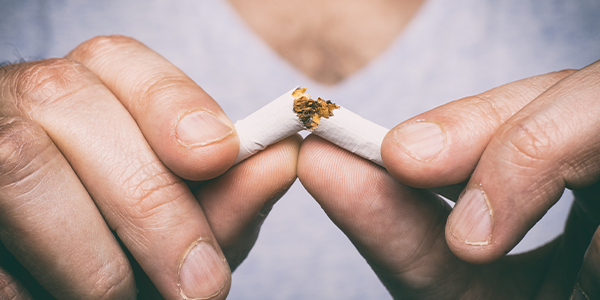If you’re a tobacco user, I don’t need to tell you that quitting isn’t easy. But it is one of the most important lifestyle changes you can make to protect your health, extend your life and save money.
The impact of smoking is significant, which means there’s no better time than right now to take a step towards a healthier, smoke-free lifestyle. As a physician, I have dedicated my career to helping people quit smoking. I’ll explain what it takes to quit smoking, the challenges you might face, and how to overcome them.
Keep in mind that it’s not just about quitting—it’s about reclaiming your life, health, and future. You are not alone on this journey, and you can succeed.
Why quitting matters
Even the heaviest tobacco user knows that smoking is bad for your health. This isn’t new information. Smoking is the number one preventable cause of death in Canada.
On average, tobacco users lose 10 to 15 years of their lives compared to those who don’t smoke. Think about that for a second. That’s at least an entire decade you could spend with your family, pursuing your passions, or simply enjoying life.
If you’re still smoking, it’s not too late to make a change that will have a lasting, positive impact on your life. In fact, within 24 hours of quitting, your risk of having a heart attack starts to decrease.
Knowing when you’re ready to quit
Addiction isn’t simple. It’s not just a bad habit; it’s a complicated relationship with nicotine that can pull you in different directions.
Some days, you might wake up feeling determined to quit, and by lunchtime, that resolve could have slipped away. That’s normal. Addiction plays tricks on your mind, making you think you’re not ready to quit or that you need to wait for the perfect moment. Here’s the reality: you don’t have to feel 100% prepared to start. You only need to be willing to try.
You’re not alone if you have tried to quit before but can’t make it work. Statistics show that at least half of all tobacco users make at least one attempt each year. This stat reminds me of a famous Mark Twain quote:
“Giving up smoking is the easiest thing in the world. I know because I’ve done it thousands of times.”
It’s obviously intended as a joke, but there’s a sliver of truth to it. While past attempts at quitting may not always stick, they are a crucial part of the process. Every attempt teaches you something valuable that will help you on your next try. So, if you’ve tried to quit before, don’t be discouraged. You’re not starting from scratch—you’re starting from experience.
Overcome cravings with the Four Ds

One of the most vital keys to quitting smoking is to manage cravings when they strike. They will likely hit hard, especially in the first few days or weeks after you stop smoking.
What you need to know is that cravings don’t last forever. They usually pass within a few minutes, and if you can tolerate that discomfort, you’ll come out stronger on the other side.
One way to handle cravings is to use the Four Ds: Delay, Distract, Deep breathing, and Drink water. Each of these strategies can help you manage your cravings effectively.
Delay
When a craving strikes, tell yourself to wait a few minutes. You can set a timer on your watch or phone for 60 or 90 seconds. Often, that’s all it takes for the urge to pass.
Distract
Have a go-to activity ready for when cravings hit. It could be something as simple as going for a walk, watching a fun or motivating video on your phone, or diving into an activity, like sudoku or an adult colouring book. The key is to keep your mind occupied.
Deep breathing
Take deep, slow breaths to calm your mind and body. This not only helps with cravings but also reduces stress, a common trigger for smoking.
Drink water
Staying hydrated is essential. Drinking water can help curb cravings and keep your body in good shape during the quit process.
If you’re looking for more creative ways to distract yourself, think about activities that keep your hands busy—like yard work, woodworking, or even playing video games. The goal is to find something that helps you focus on something other than the craving.
Additional effective strategies for quitting
The most effective way to quit smoking is to create a quit plan. This can set you up for success by helping you anticipate and prepare for challenges in advance. Here are some things you can include in your plan.
Break the routine
One of the reasons quitting can be so hard is because smoking is often tied to your daily routines. Whether it’s having a cigarette with your morning coffee or lighting up after a meal, these patterns can be powerful triggers. The trick is to shake things up.
Try switching to tea instead of coffee or walking right after you eat. These changes can weaken the association between certain activities and smoking, making it easier to break the link.
Lean on support
Quitting is tough, and you don’t have to go it alone. Whether it’s friends, family, or healthcare professionals, having a support system can make a big difference. Tell people about your plan to quit, and don’t be afraid to ask for help. Having someone to chat with during an intense craving can be a game-changer.
Consider Nicotine Replacement Therapy (NRT)
NRTs like patches, gum, or lozenges can help take the edge off cravings and withdrawal symptoms. They give your body a controlled dose of nicotine without the harmful chemicals in cigarette smoke, making it easier to quit.
Explore prescription medications
Medications like Varenicline (Champix) or Buproprion (Zyban) can be effective tools in your quit plan. These prescriptions help reduce cravings and withdrawal symptoms, giving you a better shot at quitting for good.
Facing the fear of weight gain

Weight gain is a genuine concern for many people when they quit smoking. I hear this from patients all the time. And yes, some people do gain weight after they quit. But the benefits of quitting outweigh the risks of putting on a few extra pounds. However, weight gain can be minimized with healthy lifestyle changes while quitting.
Focus on eating a balanced diet with plenty of fruits, vegetables, and whole grains. Staying active is also essential—regular exercise helps control your weight, boosts your mood, and reduces stress, which can help with cravings.
And remember, any weight you might gain after quitting smoking can be managed over time. What’s more important is that you’re protecting your heart, lungs, and overall health by quitting.
Myths and misconceptions
There are a lot of myths out there about smoking and quitting. Let’s clear up a couple of the most common ones:
Myth: “My grandfather smoked his whole life and lived to be 95, so smoking isn’t that bad.”
Reality: Sure, some people seem to beat the odds, but they’re the exception, not the rule. On average, smokers lose 10 to 15 years of their lives compared to non-smokers. Quitting is the best way to improve your chances of living a long, healthy life.
Myth: “It’s too late for me to quit. The damage is already done.”
Reality: It’s never too late to quit. Even if you’ve smoked for years, quitting now can still add years to your life and improve your quality of life. Your body starts to heal the moment you stop smoking.
Is smoking still common?
Yes, it is. There’s an assumption that smoking is done, that the problem is resolved. But the reality is that about 1 in 10 Canadian adults still smoke.
Smoking rates are higher in specific populations, including those dealing with mental health issues, substance use problems, and those in marginalized communities. The tragic reality of this fact is that the most significant health consequences and the most tremendous loss of life from tobacco are felt by those who already face above-average health and economic challenges.
Your journey starts now
Quitting smoking is one of the best decisions you can make for your health and one of the toughest. If you’re thinking about quitting, take the first step now. Contact a healthcare professional, talk to someone you trust, or visit quitnow.ca for resources and support.
The road ahead might be challenging, but you don’t have to walk it alone. With the right strategies, support, and a focus on those extra 10-15 years, you can overcome your smoking addiction and enjoy a healthier, longer life.
What is the hardest part about quitting for you? We’d love to hear from you in the comments below.






Let’s Talk!
Did you enjoy this article? Let us know in the comments.
0 Comments